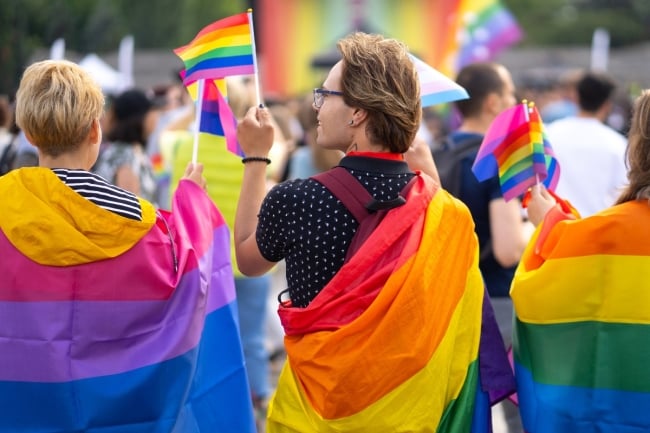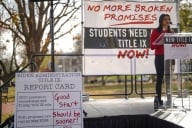You have /5 articles left.
Sign up for a free account or log in.

Even though some anti-LGBTQ+ legislation targets students in K-12, experts say it could impact higher education, too.
Vladimir Vladimirov/Getty Images
State lawmakers have proposed a record 238 anti-LGBTQ+ bills so far this year, according to an analysis by NBC News—nearly six times as many as in all of 2018. They range from a proposed school library ban on books about sexual or gender identity in Oklahoma to legislation prohibiting scholars from publicly discussing or teaching “LGBT issues or lifestyle” in Tennessee.
Much of the legislation is aimed at K-12 students, including Florida’s "Parental Rights in Education" bill—known by opponents as “Don’t Say Gay”—that prohibits classroom instruction on sexual orientation and gender identity in certain elementary grades. But the deleterious effects of these legislative efforts are seeping into higher education, normalizing antagonism toward LBGTQ+ students on some campuses and creating additional pain and stress for a population that already bears more than its fair share.
“Any time you have any type of extreme anti-LGBTQ rhetoric, it impacts not only young people in K-12, but by having this climate where the news and media are all focused on this very antitrans and antiqueer perspective with oftentimes demeaning language,18- to 24-year-olds are also impacted,” said Shane Mendez Windmeyer, executive director of Campus Pride, a national nonprofit that works to create more LGBTQ+-inclusive campuses. “LGBTQ students have a degree of resilience in college, but at the same time, they are impacted by the rhetoric, the actions and lack of support from the community. Students who are in college in Florida are impacted—their mental health, their ability to feel safe and welcomed on a campus in a state that is passing these atrocious laws is disturbing, even though they’re focused on K-12.”
Windmeyer said targeting LGBTQ+ individuals at the state level means that students who attend college in conservative states have a vastly different experience than those in liberal states.
“I do think that there are a number of statewide initiatives that are impacting communities and campuses,” Windmeyer said. “I think that’s unique in that much of the anti-LGBT movement has been moved to state policies as opposed to just federal level.”
And anti-LGBTQ+ legislation affects students beyond the campus where they live.
“It does impact the perception of safety within the state, because as a student at Florida—whether it be Florida State or University of Central Florida, or any of the other campuses across the state—students there live in the communities; they don’t just live on the campus,” Windmeyer said.
Red-state lawmakers seem especially determined to curb the rights of transgender individuals. In Texas, for instance, Governor Greg Abbott issued a directive calling on “licensed professionals” and the general public to report to state authorities the parents of any transgender minor undergoing “elective procedures for gender transitioning.” A Texas judge halted the order, but for young trans people, the damage was already done, said Ricardo Martinez, CEO of Equality Texas, a statewide LGBTQ+ political advocacy organization. The “fearmongering” fueled by the current political climate increases the risks to an already vulnerable population, he said.
“Since the nationally coordinated attacks on transgender youth by state legislatures began, we have seen a marked increase of bullying and violence against transgender youth,” Martinez said. “This type of bullying and harassment is not unique to high schools and often follows students who enroll in postsecondary education on campus.”
Martinez said the bills represent a “cruel effort” to further stigmatize and discriminate against LGBTQ+ youth.
Earlier this month, four student groups at the University of Texas at Austin jointly released a report on the state of LGBTQ+ life on campus. They surveyed more than 2,000 students and found that transgender and disabled LGBTQ+ students felt the least safe of anyone on campus.
That didn’t surprise Adrienne Hunter, director of the Queer and Trans Student Alliance, which worked with Queer & Trans Black Indigenous People of Color Agency, Students for Equity and Diversity, and the Senate of College Councils to conduct the survey.
“For me, a lot of the data just reflected my own experiences,” Hunter said. “And it reflected the experiences of my friends and reflected the experiences of so many other people who worked on the report.”
QTSA got the idea to conduct the survey about two years ago, around the start of the pandemic, Hunter said. And though they didn’t intend for its release to coincide with Abbott’s directive against transgender students, she’s glad it worked out that way. She hopes the timing will spark action at UT Austin.
“It’s just something that is really frustrating for a lot of us trans Texans down here,” Hunter said. “The whole country, but especially Texas, is so hateful towards trans folks. We’re at least hoping that at the very least, this moment can cause some administrators to realize how important it is to stand up for trans students.”
The report may actually underscore how inclusive UT is relative to the rest of the state, said Stephen Russell, department chair of human development and family sciences, who studies LGBTQ youth and served as adviser on the report.
“The statistics aren’t completely dire,” Russell said. “It’s not that every queer student at UT feels disenfranchised and terrible. It is the case that, on average, queer students have a different experience of the campus climate, but many of our students are obviously deeply engaged. So I think that’s what this report can potentially do for LGBTQ kids in Texas is to help them understand that you can go to university and find your people.”
More Campus Activism
The spate of anti-LGBTQ+ legislation has produced an unintended positive consequence: on some campuses, allies are stepping up to show their support for their LGBTQ+ classmates. Windmeyer said in recent years, student organizations at a number of institutions have worked to make their campuses more LGBTQ+ friendly.
Brigham Young University is one such place, which is especially notable, given that it’s in Utah, a red state, and affiliated with the Church of Jesus Christ of Latter-day Saints. The university officially bans LGBTQ+ relationships, but twice last year students hiked to the giant Y overlooking the campus and illuminated the letter with flashlights in rainbow colors to show their support for the LBGTQ+ community.
When the Utah state Legislature was weighing legislation that would bar transgender athletes from participating in girls’ sports, about 50 parents of LGBTQ+ students hiked up the hill on March 19, around the one-year anniversary of the first rainbow show that students hiked. The university was ready: BYU had fenced off the area and added signs warning that demonstrations were prohibited, The Salt Lake Tribune reported.
Parents of LGBTQ+ students and other allies joined the demonstration to keep students from getting in trouble, said Bradley Talbot, a recent BYU graduate who founded Color the Campus, an LGBTQ+ movement at the university, and helped organize the demonstrations. They broke through the orange-mesh fence and lit up the Y with pink, blue and white flashlights to represent the transgender pride flag. Talbot said the demonstration was meant to show solidarity with the BYU transgender community.
“This is definitely a moment for [BYU], because I think there are students and alumni who are really pushing hard to activate and to create change,” said Windmeyer. “Every campus has its own journey. At BYU right now, I think that there’s definitely a shift in activism. That is a good thing.”
Republican Utah governor Spencer Cox vetoed the antitrans bill, but on Friday the Utah state Legislature voted to override the veto, banning transgender athletes from participating in girls’ sports.
Still, the transgender-flag lighting gives students hope.
“Every single individual who was on that mountain holding a light was there representing somebody else,” Talbot said. “I think it’s really important for people to see that there are things that you can do and that you should do. You have to go out of your comfort zone a little bit, take risks, be bold and be seen, in order to be a good ally, to show love and support.”








